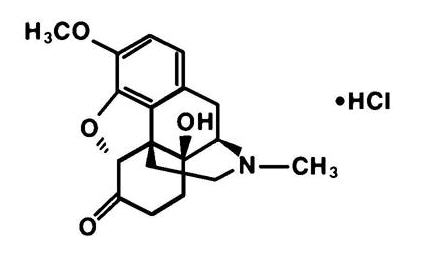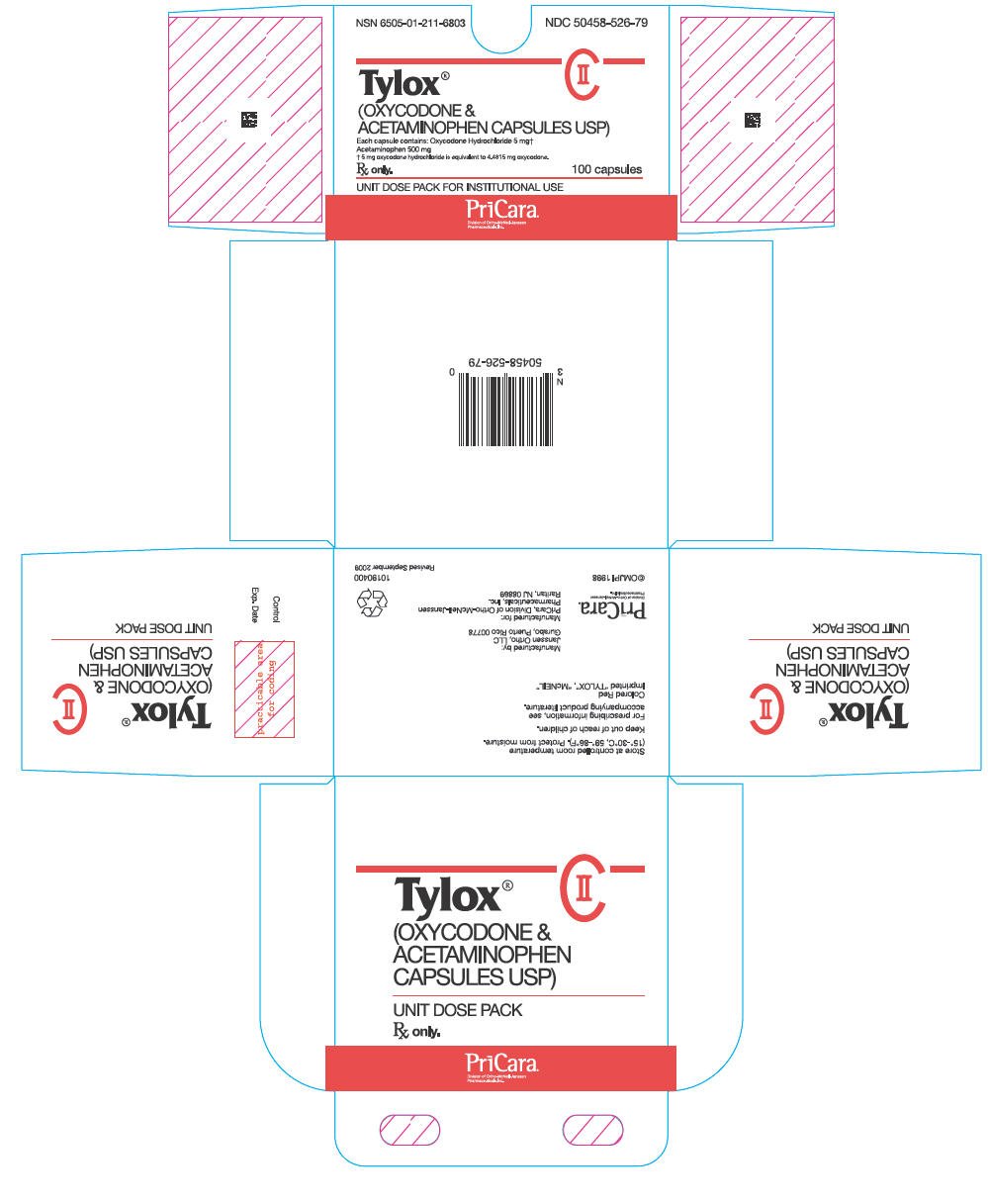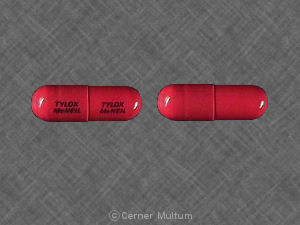Tylox: Package Insert / Prescribing Info
Package insert / product label
Generic name: acetaminophen and oxycodone hydrochloride
Dosage form: capsule
Drug class: Narcotic analgesic combinations
Medically reviewed by Drugs.com. Last updated on Mar 25, 2025.
The Tylox brand name has been discontinued in the U.S. If generic versions of this product have been approved by the FDA, there may be generic equivalents available.
On This Page
HEPATOTOXICITY
Acetaminophen has been associated with cases of acute liver failure, at times resulting in liver transplant and death. Most of the cases of liver injury are associated with the use of acetaminophen at doses that exceed 4,000 milligrams per day, and often involve more than one acetaminophen-containing product (see WARNINGS).
Tylox Description
Each capsule of TYLOX® (oxycodone and acetaminophen capsules USP) contains:
|
|
| Oxycodone Hydrochloride USP | 5 mg* |
| Warning — May be habit forming. | |
| Acetaminophen USP | 500 mg |
Inactive ingredients: docusate sodium, gelatin, magnesium stearate, sodium benzoate, sodium metabisulfite1, corn starch, FD&C Blue No. 1, FD&C Red No. 3, FD&C Red No. 40, and titanium dioxide.
Acetaminophen occurs as a white, odorless crystalline powder, possessing a slightly bitter taste.
The oxycodone component is 14-hydroxy-dihydrocodeinone, a white, odorless crystalline powder having a saline, bitter taste. It is derived from the opium alkaloid thebaine, and may be represented by the following structural formula:

Tylox - Clinical Pharmacology
The principal ingredient, oxycodone, is a semi-synthetic narcotic analgesic with multiple actions qualitatively similar to those of morphine; the most prominent of these involve the central nervous system and organs composed of smooth muscle. The principal actions of therapeutic value of the oxycodone in TYLOX® (oxycodone and acetaminophen capsules) are analgesia and sedation.
Oxycodone is similar to codeine and methadone in that it retains at least one-half of its analgesic activity when administered orally.
Acetaminophen is a nonopiate, nonsalicylate analgesic and antipyretic.
Indications and Usage for Tylox
TYLOX® (oxycodone and acetaminophen capsules) are indicated for the relief of moderate to moderately severe pain.
Contraindications
TYLOX® (oxycodone and acetaminophen capsules) should not be administered to patients who are hypersensitive to any component.
Warnings
Hepatotoxicity
Acetaminophen has been associated with cases of acute liver failure, at times resulting in liver transplant and death. Most of the cases of liver injury are associated with the use of acetaminophen at doses that exceed 4,000 milligrams per day, and often involve more than one acetaminophen-containing product. The excessive intake of acetaminophen may be intentional to cause self-harm or unintentional as patients attempt to obtain more pain relief or unknowingly take other acetaminophen-containing products (see Boxed Warning).
The risk of acute liver failure is higher in individuals with underlying liver disease and in individuals who ingest alcohol while taking acetaminophen.
Instruct patients to look for acetaminophen or APAP on package labels and not to use more than one product that contains acetaminophen. Instruct patients to seek medical attention immediately upon ingestion of more than 4,000 milligrams of acetaminophen per day, even if they feel well.
Hypersensitivity/Anaphylaxis
There have been post-marketing reports of hypersensitivity and anaphylaxis associated with the use of acetaminophen. Clinical signs included swelling of the face, mouth, and throat, respiratory distress, urticaria, rash, pruritus, and vomiting. There were infrequent reports of life-threatening anaphylaxis requiring emergency medical attention. Instruct patients to discontinue TYLOX® immediately and seek medical care if they experience these symptoms. Do not prescribe TYLOX® for patients with acetaminophen allergy.
TYLOX® contains sodium metabisulfite, a sulfite that may cause allergic-type reactions including anaphylactic symptoms and life-threatening or less severe asthmatic episodes in certain susceptible people. The overall prevalence of sulfite sensitivity in the general population is unknown and probably low. Sulfite sensitivity is seen more frequently in asthmatic than in nonasthmatic people.
Drug Dependence
Oxycodone can produce drug dependence of the morphine type and, therefore, has the potential for being abused. Psychic dependence, physical dependence, and tolerance may develop upon repeated administration of TYLOX® (oxycodone and acetaminophen capsules), and it should be prescribed and administered with the same degree of caution appropriate to the use of other oral narcotic-containing medications. Like other narcotic-containing medications, TYLOX® is subject to the Federal Control Substances Act (Schedule II).
Precautions
General
Head Injury and Increased Intracranial Pressure
The respiratory depressant effects of narcotics and their capacity to elevate cerebrospinal fluid pressure may be markedly exaggerated in the presence of head injury, other intracranial lesions or a preexisting increase in intracranial pressure. Furthermore, narcotics produce adverse reactions which may obscure the clinical course of patients with head injuries.
Information for Patients
- Do not take TYLOX® if you are allergic to any of its ingredients.
- If you develop signs of allergy such as a rash or difficulty breathing, stop taking TYLOX® and contact your healthcare provider immediately.
- Do not take more than 4,000 milligrams of acetaminophen per day. Call your healthcare provider if you took more than the recommended dose.
- Oxycodone may impair the mental and/or physical abilities required for the performance of potentially hazardous tasks such as driving a car or operating machinery. Exercise caution until you are reasonably certain that TYLOX® does not adversely affect your ability to engage in such activities.
Drug Interactions
Patients receiving other narcotic analgesics, general anesthetics, phenothiazines, other tranquilizers, sedative-hypnotics, or other CNS depressants (including alcohol) concomitantly with TYLOX® may exhibit an additive CNS depression. When such combined therapy is contemplated, the dose of one or both agents should be reduced.
The concurrent use of anticholinergics with narcotics may produce paralytic ileus.
Usage in Pregnancy
Pregnancy Category C
Animal reproductive studies have not been conducted with TYLOX®. It is also not known whether TYLOX® can cause fetal harm when administered to a pregnant woman or can affect reproductive capacity. TYLOX® should not be given to a pregnant woman, unless in the judgment of the physician, the potential benefits outweigh the possible hazards.
Labor and Delivery
As with all narcotics, administration of TYLOX® to the mother shortly before delivery may result in some degree of respiratory depression in the newborn and the mother, especially if higher doses are used.
Adverse Reactions/Side Effects
The most frequently observed adverse reactions include lightheadedness, dizziness, sedation, nausea, and vomiting. These effects seem to be more prominent in ambulatory than in non-ambulatory patients, and some of these adverse reactions may be alleviated if the patient lies down.
Other adverse reactions include allergic reactions, euphoria, dysphoria, constipation, skin rash, and pruritus. At higher doses, oxycodone has most of the disadvantages of morphine including respiratory depression.
Related/similar drugs
Drug Abuse and Dependence
TYLOX® capsules are a Schedule II controlled substance.
Oxycodone can produce drug dependence and has the potential for being abused (see WARNINGS).
Overdosage
Following an acute overdosage, toxicity may result from the oxycodone or the acetaminophen.
Signs and Symptoms
Toxicity from oxycodone poisoning includes the opioid triad of: pinpoint pupils, depression of respiration, and loss of consciousness. Serious overdosage with oxycodone is characterized by respiratory depression (a decrease in respiratory rate and/or tidal volume, Cheyne-Stokes respiration, cyanosis), extreme somnolence progressing to stupor or coma, skeletal muscle flaccidity, cold and clammy skin, and sometimes bradycardia and hypotension. In severe overdosage, apnea, circulatory collapse, cardiac arrest, and death may occur.
In acetaminophen overdosage: dose-dependent potentially fatal hepatic necrosis is the most serious adverse effect. Renal tubular necrosis, hypoglycemic coma, and coagulation defects may also occur. Early symptoms following a potentially hepatotoxic overdose may include: nausea, vomiting, diaphoresis, and general malaise. Clinical and laboratory evidence of hepatic toxicity may not be apparent until 48 to 72 hours post-ingestion.
Treatment
A single or multiple drug overdose with oxycodone and acetaminophen is a potentially lethal polydrug overdose, and consultation with a regional poison control center is recommended. Immediate treatment includes support of cardiorespiratory function and measures to reduce drug absorption. Oxygen, intravenous fluids, vasopressors, and other supportive measures should be employed as indicated. Assisted or controlled ventilation should also be considered.
Oxycodone
Primary attention should be given to the reestablishment of adequate respiratory exchange through provision of a patent airway and the institution of assisted or controlled ventilation. The narcotic antagonist naloxone hydrochloride is a specific antidote against respiratory depression which may result from overdosage or unusual sensitivity to narcotics, including oxycodone. Since the duration of action of oxycodone may exceed that of the antagonist, the patient should be kept under continued surveillance, and repeated doses of the antagonist should be administered as needed to maintain adequate respiration. A narcotic antagonist should not be administered in the absence of clinically significant respiratory or cardiovascular depression.
Acetaminophen
Gastric decontamination with activated charcoal should be administered just prior to N-acetylcysteine (NAC) to decrease systemic absorption if acetaminophen ingestion is known or suspected to have occurred within a few hours of presentation. Serum acetaminophen levels should be obtained immediately if the patient presents 4 hours or more after ingestion to assess potential risk of hepatotoxicity; acetaminophen levels drawn less than 4 hours post-ingestion may be misleading. To obtain the best possible outcome, NAC should be administered as soon as possible where impending or evolving liver injury is suspected. Intravenous NAC may be administered when circumstances preclude oral administration.
Vigorous supportive therapy is required in severe intoxication. Procedures to limit the continuing absorption of the drug must be readily performed since the hepatic injury is dose-dependent and occurs early in the course of intoxication.
Tylox Dosage and Administration
Dosage should be adjusted according to the severity of the pain and the response of the patient. However, it should be kept in mind that tolerance to oxycodone can develop with continued use and that the incidence of untoward effects is dose related. This product is inappropriate even in high doses for severe or intractable pain.
TYLOX® (oxycodone and acetaminophen capsules) are given orally. The usual adult dosage is one TYLOX® capsule every 6 hours as needed for pain.
How is Tylox supplied
TYLOX® (oxycodone and acetaminophen capsules USP) contains 5 mg oxycodone and 500 mg acetaminophen. The capsules are red and imprinted with "TYLOX" "McNEIL". TYLOX® is available as follows:
Bottles of 100 capsules - NDC 50458-526-60
Hospital Unit Dose 100 capsules – NDC 50458-526-79
Manufactured by:
Janssen Ortho, LLC
Gurabo, Puerto Rico 00778
Manufactured for:
PriCara, Division of Ortho-McNeil-Janssen Pharmaceuticals, Inc.
Raritan, NJ 08869
Revised October 2011
© Ortho-McNeil-Janssen Pharmaceuticals, Inc. 2000
10187201
PRINCIPAL DISPLAY PANEL - 100 Capsule Carton
NSN 6505-01-211-6803
NDC 50458-526-79
CII
Tylox®
(OXYCODONE &
ACETAMINOPHEN CAPSULES USP)
Each capsule contains: Oxycodone Hydrochloride 5 mg†
Acetaminophen 500 mg
† 5 mg oxycodone hydrochloride is equivalent to 4.4815 mg oxycodone.
Rx only.
100 capsules
UNIT DOSE PACK FOR INSTITUTIONAL USE
PriCara®
Division of Ortho-McNeil-Janssen
Pharmaceuticals, Inc.

| TYLOX
acetaminophen and oxycodone hydrochloride capsule |
||||||||||||||||||||||||
|
||||||||||||||||||||||||
|
||||||||||||||||||||||||
|
||||||||||||||||||||||||
|
||||||||||||||||||||||||
|
||||||||||||||||||||||||
|
||||||||||||||||||||||||
| Labeler - Ortho-McNeil-Janssen Pharmaceuticals, Inc. (063137772) |
| Establishment | |||
| Name | Address | ID/FEI | Business Operations |
|---|---|---|---|
| Janssen Ortho, LLC | 062191882 | MANUFACTURE | |
| Establishment | |||
| Name | Address | ID/FEI | Business Operations |
|---|---|---|---|
| Diosite | 409664849 | API MANUFACTURE | |
| Establishment | |||
| Name | Address | ID/FEI | Business Operations |
|---|---|---|---|
| Ortho-McNeil-Janssen Pharmaceuticals, Inc. | 063137772 | ANALYSIS | |
| Establishment | |||
| Name | Address | ID/FEI | Business Operations |
|---|---|---|---|
| Mallinckrodt | 097722284 | ANALYSIS, API MANUFACTURE | |
More about Tylox (acetaminophen / oxycodone)
- Check interactions
- Compare alternatives
- Reviews (14)
- Drug images
- Side effects
- Dosage information
- During pregnancy
- Drug class: narcotic analgesic combinations
Patient resources
Professional resources
Other brands
Percocet, Endocet, Roxicet, Primlev, ... +3 more

